Asphalt vs Composite Shingles: Which Is Right for Me?
-

- Last updated:
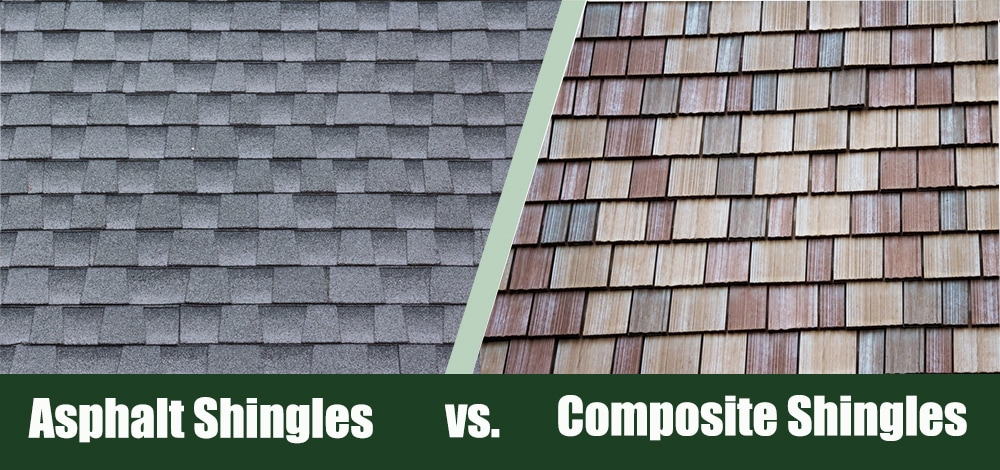
Roofing is one of the most crucial parts of home improvement. It’s also an investment that can make or break the value and cost of home ownership. Like most homeowners, you want the most out of your home’s roof. You want to ensure your roof looks good and will stand the test of time.
Shingles are an excellent way to add a finished look to your home or industrial building. They’re also the traditional choice for homeowners looking to add some flair to the exterior of their homes. Composite and asphalt shingles can accomplish these primary things.
These shingles are two different products. But which is right for you? Both are durable options that should last you more than 20 years, but they have their pros and cons. We’ll look at the two roofing shingles and give you several key differences between them. This way, you can decide what the right roofing shingles for your home are. So, without further ado, let’s jump right into it!

What Are Asphalt Roofing Shingles?
Asphalt shingles are composed of a granular layer of asphalt cement, a mineral granule layer, and a fine aggregate base. The granular layer is made of recycled rubber tires, and the mineral granule layer is made from recycled glass.
The mineral granule layer adds strength and durability to the asphalt shingle. On the flip side, the fine aggregate base provides drainage and support for the roof.
What Are Composite Roofing Shingles?
Composite shingles are a type of synthetic material that mimics the look and feel of natural wood. They are made of two materials, meaning they’re stronger and more durable compared to asphalt shingles.
Usually, a composite roof is made from fiberglass or polyester, with a layer of asphalt between them. The asphalt keeps water out of the roof and prevents leaking. Composite roofing shingles provide a much longer lifespan.

Overview of Asphalt Shingles
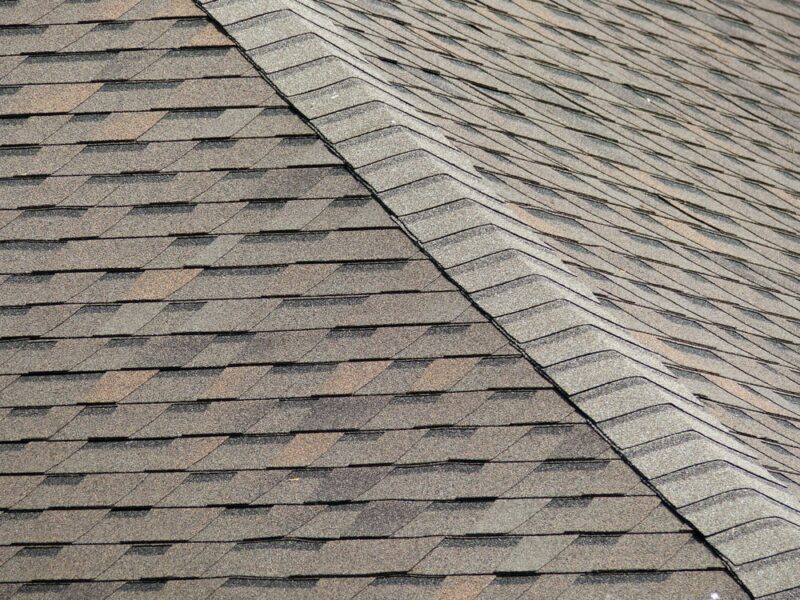
Asphalt shingles are a durable option for residential homes and commercial buildings. They are available in different designs, colors, and textures to complement your home’s style. Here are several remarkable properties of asphalt shingles.
Weather Resistance
The best way to protect your asphalt shingles from weather elements is to ensure they’re properly installed. If a roofing shingle is damaged during installation, replace it immediately. Properly installed asphalt shingles can withstand the harshest weather conditions.
Asphalt shingles also have a high resistance to UV rays. They retain their color over time and do not fade easily. They are also waterproof, which means they will not leak or be damaged by rainwater.
Fire Resistance
The National Fire Protection Association (NFPA) measures the fire resistance of roofing shingles. It established a standard for rating the fire resistance of roofing materials. According to this standard, a Class A roofing material is non-flammable and self-extinguishing.
It means that it doesn’t support combustion and, when ignited, will extinguish itself. Asphalt roofing shingles have a Class A rating. That means it can withstand exposure to a flame source for up to four hours without sustaining damage.
Impact Resistance
This is how well a material can resist damage by impact from outside forces, such as falling objects like stones. Asphalt shingles come in different grades, such as Classes 3 and 4. These classifications determine the impact resistance of the product. It’s crucial since it prevents impact damage.
Impact resistance is rated on a scale from 1 to 5, with 1 being the lowest and 5 being very high. The higher the class number, the greater the impact resistance of your roofing material.
Many asphalt roofing shingles have an impact resistance of Class 4. Some of them also have an impact resistance of Class 3. It means asphalt roofing shingles can hold up well against hail and other impact damage.
Strength and Toughness
The material that makes the asphalt shingles determines their strength and toughness. If the shingles aren’t strong enough, they will crack or tear when subjected to stress.
Asphalt shingles have a higher strength than wood shakes or other materials used in roofing shingles. Manufacturers also use different materials and coatings to achieve this. Some manufacturers use glass fibers to reinforce their shingles. Others may add other materials, such as polyester, polypropylene, or Kevlar. These types of materials add strength to roof shingles.
Mineral Granules
Asphalt shingles comprise mineral granules made of several materials, including sand, rock, and mineral particles. The primary component is asphalt, which is added to the mix with other ingredients to make it suitable for use in roofing materials.
A layer of asphalt covers the mineral granules. This coating protects them from UV damage. It also helps them stick to each other when installed on your roof.
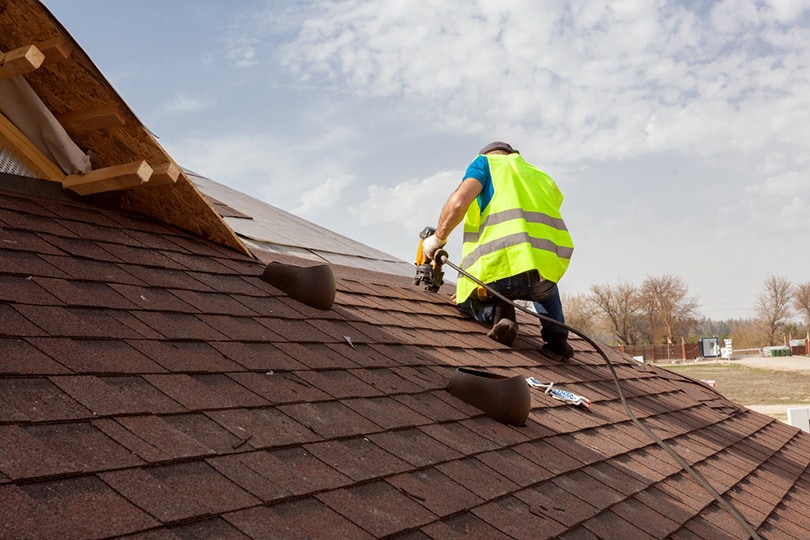
Types of Asphalt Roofing Shingles
Asphalt shingles come in three primary types: 3-tab, dimensional, and luxury asphalt shingles. We’ll look at them briefly.
- 3-Tab Asphalt Shingles: They’re the most common and cheapest asphalt roofing shingles in the market today. 3-tab asphalt shingles consist of three tabs that run along the bottom of each shingle. These tabs are designed with interlocking ridges that allow them to be installed in a staggered fashion, reducing the number of visible seams. 3-tab asphalt shingles can last up to 25 years with proper maintenance.
- Dimensional Asphalt Shingles: They’re made from a piece of material rolled into a unique shape. Dimensional asphalt shingles mimic the appearance of a wood-shake roof. These shingles last longer than 3-tab asphalt shingles. That’s why they’re popular with both contractors and homeowners alike. However, they are a bit expensive compared to the 3-tab shingles.
- Luxury Asphalt Shingles: They’re a more expensive and durable option compared to other asphalt shingles. They can last up to 50 years if maintained well. Luxury asphalt shingles have an enhanced 25-year warranty against defects in materials. They provide better protection from the elements. They can match the style of your home’s exterior.
- Pocket-friendly roofing material
- You can replace individual asphalt shingles if need be
- A wide range of color schemes and styles to select from
- Easy installation process
- Suitable for any roofing style
- It gives your house a more traditional appearance
- Prone to moss and mildew growth
- Fade in the sun
- Needs regular maintenance
- Not eco-friendly
- Shorter lifespan
- Cracks when subjected to impact
- It doesn’t rust

Overview of Composite (Synthetic) Shingles

Composite shingles are the latest trend in residential roofing. They’re also made of synthetic materials and look like wood shakes. Composite shingles are quickly becoming a popular choice for home and business owners alike.
Let’s look at several properties of composite roofing shingles:
Weather Resistance
They’re an excellent option for homeowners who live in areas that experience severe weather conditions. They can withstand wind, rain, and snow without needing replacement. They’re also made using polymers that repel water and resist damage from UV rays.
Fire Resistance
Composite roofing shingles resist fire better than other roofing shingles. They can withstand temperatures up to 500 degrees Fahrenheit. Also, they have a Class A fire rating. It means they won’t burn when exposed to flames.
It makes them an excellent choice for homes in areas prone to wildfires. Class C composite shingles can slow fires and endure heat well compared to Class C asphalt shingles.
Impact Resistance
The material used in composite shingles is strong and can withstand impacts. Their impact resistance is higher than that of other types of roofing shingles. It makes them an excellent choice for homes in areas with high winds or hail storms.
Besides, they’re less likely to crack or split due to impact damage. This prevents roof leaks as they won’t tear easily like traditional asphalt shingles might when experiencing impact.
Strength and Toughness
A synthetic roof shingle can withstand strong winds, hail, and freezing temperatures. The material is manufactured by combining resin with sand and glass fibers.
The resulting material is stronger than natural materials like wood or straw. Also, composite roofing shingles cannot be ripped off by strong hurricane winds.
Mineral Granules
The mineral granules are made of aluminum oxide and quartz. They are bonded to a fiberglass mat, and then embedded in an asphalt binder.
The mineral granules protect the composite shingle from ultraviolet rays. Mineral granules also give the composite roofing shingle a longer life. Besides, they prevent moisture from penetrating the roof.
The amount of mineral granules in roofing shingles and how they’re mixed with the asphalt binder determines the color and texture of the roofing shingle.
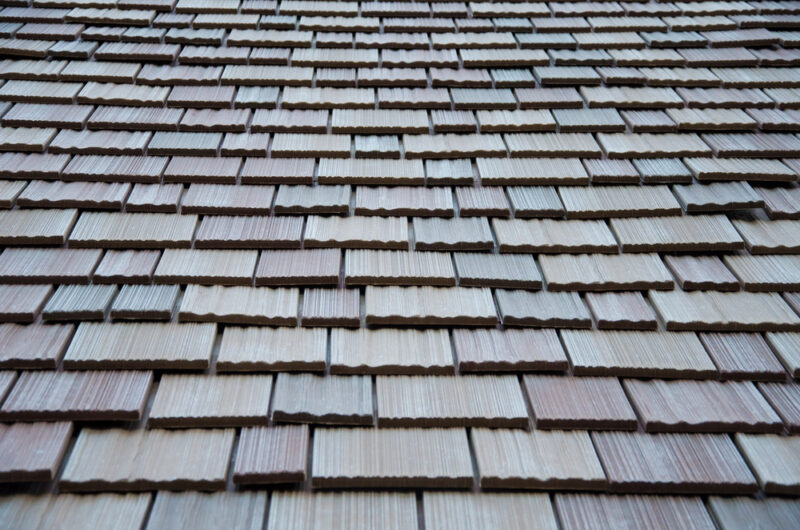
Types of Composite (Synthetic) Roofing Shingles
Composite roofing shingles are a new type of roofing material that can help homeowners save money in the long run. There are several types of composite shingles available today. They include:
- Composite Shake Tile: It’s a synthetic roofing shingle that looks like a wood shake, but it’s made from recycled materials. The material used in composite shakes can be recycled up to three times. It makes them a sustainable option for your home. The look of a composite shingle is similar to the appearance of real wood. But, it’ll not need maintenance like you would need to do with real wood shakes. Its size ranges from four 10-12 inches wide.
- Composite Barrel Tile: It’s similar in appearance to the natural slate tile, but it’s made from a different material called polymer-modified cement board or “PMC”. These tiles come in many colors and thicknesses ranging from 1/8 to 3/8-inch thick. They also have varying shades of brown and gray. These colors are used as accents throughout each patterned design.
- Composite Slate Tile: This synthetic roofing is similar to natural slate and is made to look like real slate because it has a granular surface with a matte finish. It has a more traditional appearance and is ideal for homes with an older architectural style. It can reflect heat and UV rays, thus reducing cooling costs in the summer and insulates your home in the winter. Composite slate tiles are also durable and fade-resistant. It’s an excellent choice if you have a steep slope on your roof. Besides, these roofing shingles are heavier and more durable than other synthetic roofing shingles.
- Long lifespan
- Available in many styles, colors, and textures
- Resistant to stains, algae, and mildew
- Eco-friendly
- It can endure extreme temperatures and weather conditions
- Offers better insulation
- Fire-resistant
- Minimal maintenance needed
- Customizable
- Regulate heat in the house
- Expensive
- Not used widely compared to asphalt roofing shingles
- Can crack or break due to impact
- It doesn’t offer wind resistance

What Are the Differences Between Asphalt and Composite Shingles?
Composite and asphalt shingles are popular choices for roofing materials. They have their benefits. They also have differences that may make one more ideal than the other. It all depends on your needs.
Here are several differences between these two roofing shingles.
Cost
Usually, asphalt shingles are less expensive than composite shingles. Composite shingles can cost around three or four times the cost of asphalt roofing shingles. The reason is that the composite material used in the shingles is more durable than asphalt and will last longer. You don’t have to replace your roof as often. It saves you money in the long run.
Asphalt is less expensive due to its more basic design. It needs less material to manufacture compared to composite shingles. Asphalt shingles also have a lower installation cost. You can install them in many ways compared to composite shingles.
Curb Appeal
Curb appeal is a crucial part of the overall appearance of your home. Consider the kind of roofing shingle you want when you have a new roof.
Composite shingles are an excellent choice for curb appeal. They have a smooth surface that makes them blend in with the rest of your home. They also have a nice look that complements any home design and style.
On the other hand, asphalt shingles come in many colors and styles. You can use them to create attractive designs for the roofline of your home.
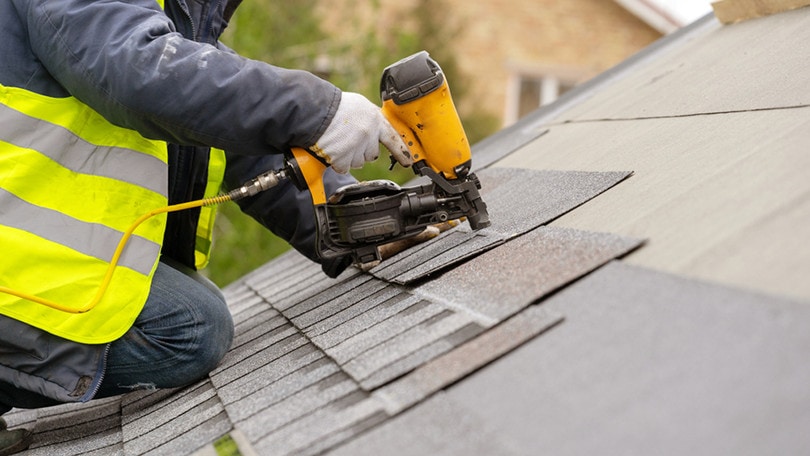
Lifespan
Asphalt shingles last between 12 and 30 years before needing replacement. Composite shingles can last up to 50 years before replacing them! The materials used to make composite roofing shingles can endure harsh weather conditions. They’re better than materials used to manufacture asphalt roofing shingles.
You will save yourself money by choosing composite over asphalt because you won’t need to replace it so soon. But, asphalt shingles last longer in climates with harsh winters. They can withstand the weight and stress of heavy snow.
Composite shingles may not be as durable in these situations. They can crack and break under heavy loads. Besides, composite shingles are not recommended for areas with high wind speed given their lightweight composition.
Material Makeup
While asphalt shingles and composite shingles are made of a base material, the asphalt base is different from the composite. Asphalt shingles are made by adhering a mineral granule layer to a polypropylene or polyethylene backing. Then, it’s bonded with asphalt.
Composite shingles are made from polyester or glass fibers mixed with plastic resins. They adhere to a plywood core. The polyester or glass fibers provide strength, while the resins give them flexibility.
Ease of Installation
You can install asphalt shingles over existing asphalt roofs or new wood shake roofs. Besides, you can use fasteners or mechanical attachment systems such as staples or nails. It depends on how they were installed originally.
You can also use asphalt shingles as a standalone roofing material. It’s ideal for older homes that don’t have an existing roof covering already installed on them. You can install asphalt roofing shingles on your own if you follow instructions.
Composite shingles are trickier to install. It’s because there is no overlap like there is with asphalt shingles. It makes them more challenging for DIYers. It also increases the cost of labor if you hire someone else to do it for you.


Asphalt vs Composite Shingles: Which Is Right for You?
Asphalt and composite shingles have their pros and cons. But still, many prefer asphalt to feel more traditional. Also, asphalt may be a good pick for you if you want the most budget-friendly option for your situation.
If you’re looking for a more durable roofing shingle, go for composite shingles. They last longer with minimal maintenance.
At the end of the day, both asphalt shingles and composite shingles are excellent options for home improvement. Asphalt shingles will keep you more in the budget, while composite shingles are a bit more high-end.
But either way, both materials provide exceptional value to homeowners looking to improve the look of their homes.
- If you’re on a budget
- If you want roofing shingles you can DIY
- If you want your house to have a traditional appearance
- If you don’t want to perform regular maintenance on roofing shingles
- If you live in an area with frequent harsh weather periods
- If you want your home to have a modern/contemporary look

Conclusion
There’s no bad choice when choosing roofing shingles for your home. Both asphalt and composite shingles have their perks. Choosing between the two depends on your needs. Again, consider using a long-lasting material if you want the best bang for the buck.
That way, you’ll only need to make the biggest investment once during your home’s lifespan. Let’s be honest- replacing materials many times can get expensive fast.
We’ve pulled together everything you need to know about asphalt and composite shingles to help you make an educated decision. Whether you’re looking for a quick summary of how they compare or want the nitty-gritty details, everything you need is here!
Featured Image Credit: Left -Asphalt Shingles (Ratchat, Shutterstock), Right – Composite Shingles (Natalia S Wilkinson, Shutterstock)
Contents
